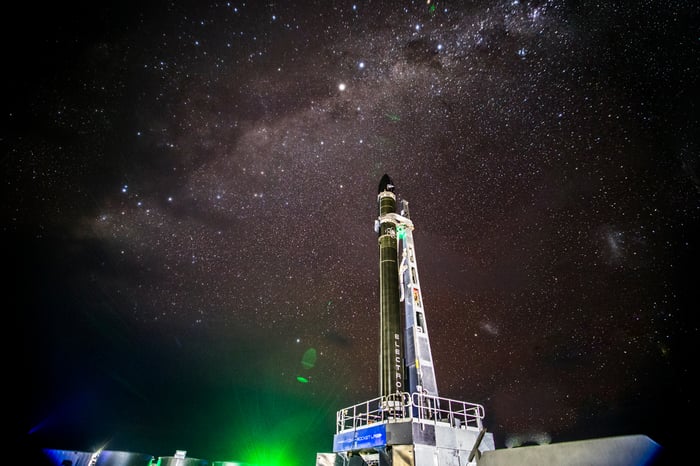Rocket Lab (RKLB 1.14%) stock is on a tear. Over just the past week, Rocket Lab has announced:
- A $32 million U.S. Space Force contract to put a "VICTUS HAZE Tactically Responsive Space" satellite in orbit.
- Another Space Force contract to launch a DISKSat into very low earth orbit for $14.5 million.
- Plans to reuse one of its Electron first-stage rockets in an orbital launch for the first time ever.
You might not guess it from the stock price (which is down 13% since the end of March), but all of the above follows Rocket Lab's announcement that it launched its 46th successful mission in March, and is planning to launch No. 47 later in April. As Rocket Lab gears up to report its financial results for first-quarter 2024 on May 6, the company clearly has some momentum. But the truth is even bigger than that: Rocket Lab is now growing faster than SpaceX.

Rocket Lab Electron rocket before launch. Image source: Rocket Lab, by photographer Kieran Fanning.
Eat your heart out, Elon Musk
For the better part of a decade, SpaceX -- the pioneering space company founded by billionaire Elon Musk -- has set the standard for rapid growth by space stocks. In 2023, SpaceX launched a total of 98 times, including two Starship test flights. In 2024, it plans to launch as many as 144 rockets -- 47% year over year growth.
In contrast, tiny Rocket Lab flew only nine successful Electron missions last year. That doesn't even put it in the same league as SpaceX ... yet. But in Q1 2024 alone, Rocket Lab launched four times. At its present pace, the rocket company could easily launch 16 times this year, which would work out to 77% growth over 2023.
For Musk, the comparison may prove frustrating. After all, in order to hit his target for 144 launches this year, SpaceX really should be launching about 36 missions per quarter, but it managed "only" 32 in Q1.
Don't cry for SpaceX
Mind you, none of this is a knock on SpaceX. According to a recent tally of rocket launches, worldwide, compiled by our friends at Payload Research, SpaceX launched more often than any other launcher in the world last quarter. Not only did SpaceX put eight times more payloads (and much bigger payloads) in orbit than did Rocket Lab, SpaceX launched twice as many rockets as China, 16 times as many rockets as India, and launched 32 times as fast as its once-archrival United Launch Alliance.
In fact, add up every other rocket launch by every other launch provider in the world not named SpaceX last quarter (31 launches total), and SpaceX still launched more than the lot of 'em (32 launches).
Should you buy Rocket Lab stock?
All this being said, SpaceX remains a private company, and not something that most investors can invest in. (Although there are ways...) Rocket Lab, in contrast, as a publicly traded stock, is something you can invest in.
But should you?
That's really less a question of launch cadence, and more a question of how patient an investor you are. You see, no matter how fast Rocket Lab is growing its launch cadence, the company still isn't earning a lot of money from launching rockets -- and maybe never will.
Rocket Lab only (finally) managed to eke out a gross profit from its launch services business in 2023, earning an 11.3% gross margin. Operating and net profits from launch were both negative, however.
Unless Rocket Lab's long-awaited "Neutron" launch vehicle changes the economics of spaceflight for the company, Rocket Lab's best chance of earning profits in the future lies with its much faster-growing and more profitable space systems business, which focuses on building spacecraft parts, satellites, and other spacecraft. Despite the undeniable, fiery attraction of honest-to-goodness rocket launches, with revenues up 82-fold over the last three years, and gross profit margins of 25%, space systems is the more-likely profits-driver for Rocket Lab going forward.
Even if Space Systems grows as expected, however, most analysts agree: Rocket Lab's first net profit probably won't arrive before 2026 -- and probably won't be much more than $0.09 per share even then. At a valuation of 40 times those very forward earnings (profits that it might, but also might not, earn), I'm afraid Rocket Lab stock remains a pretty speculative bet of a space stock.
Only invest in it if you have a lot of patience, and a lot of tolerance for the risk that the bet may not pay off at all.





